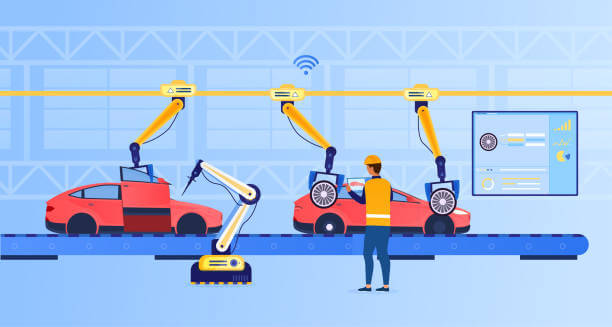We are on the precipice of the fourth industrial revolution which is set to change everything about the way we work. A big difference between this revolution and the previous three is the type of work that is going to be automated.
Previously, physical work was the target for automation, but this time it’s cognitive work that will be changing in a major way through automation and technology. In this article, I’m going to talk more about how this is set to change the way accounting firms operate forever.
Background
Currently, accounting firms add people to their team to boost capacity to complete more work. However, using what’s referred to as intelligent automation, this process is set to change in a major way.
From a performance perspective, people are often better at building processes than doing the actual work. Work in this case is anything that classifies as repetitive, tedious and requires intense attention to detail to be done well. People just aren’t designed to serve this need well.
However, many of us are aware of this fact and that’s one of the reasons why intelligent automation has been invented. This technology is intended to make up for our shortcomings in a major way and enable us to perform important tasks at a level that we never before thought possible.
First, let’s talk more about what I mean when I say intelligent automation.
Intelligent Automation
You are more than likely already familiar with automation. I’m sure you’ve seen examples of assembly lines that move cars from station to station as components are added to become the final product. This is an example of traditional automation.
Intelligent automation on the other hand, is quite different. Unlike basic automation, intelligent automation is capable of taking many inputs to produce many outputs. I’ll continue with the assembly line analogy to help you better understand the difference.
With traditional automation, the assembly line is designed around our needs and the output it produces is to move at a certain speed consistently to move a car through the stations of assembly as it is built. However, if this same assembly line was built using intelligent automation it would be able to take many inputs to produce many outputs. For example, if the workers building the cars get tired and start slowing down the assembly line would slow down to match their speed or speed up if they start moving faster.
You see, with intelligent automation, the assembly line will always be moving at the maximally optimal speed to produce the best results. The automation in this case is intelligent because it can make adjustments to the output it produces based on many inputs and it can also learn our behavior to further optimize its performance. Isn’t that neat?
Now let’s talk more about what this means for accounting firms.
Audit Example
Intelligent automation provides countless opportunities for improvement to the way an accounting firm currently operates. At the moment, your firm is likely performing audit services manually. This means that at a certain day and time, your team is pouring over financial reports for your clients looking for anomalies in the numbers that may be of concern and need to be addressed.
A big problem with this approach is also why the audit industry has been subject to scrutiny themselves for failing to keep up with rising demand for the performance of the service – it’s severely outmatched. The amount of data required to be reviewed is growing exponentially while audit capacity can only currently grow by the rate in which teams grow which is linearly at best. This gap is growing larger each day and many audit teams find themselves with a target on their back without the ability to level the playing field – at least until now.
Intelligent automation makes it possible to hire machines to not only do this work for us, but more accurately and comprehensively than ever before. The vast majority of the audit work done by accounting firms is reactive meaning we wait for the reports to review them. However, with intelligent automation technology we can now continuously search for anomalies in the data before official reports are produced so issues can be identified sooner or even predicted before they are obvious. This increases the value a CPA firm can offer their clients because they can eliminate problems before they become more significant.
Let’s talk about what these changes mean for your role.

Get our awesome product content delivered daily-ish to your inbox
Your Role Will Evolve
Intelligent automation will usher in a new era for accounting firms and the value they can offer their clients. However, to take full advantage of these powerful capabilities your role must change.
No longer will teams be expected to focus on the tedious, time consuming and error prone tasks of the past. Instead, your role will become learning how to best manage this technology to generate optimal results.
This will mean understanding the technology and how to leverage the tools. You’ll need to be aware of what it takes to train intelligent automation technology so that it can learn the rules that need to be applied to the work it is expected to do. It will feel much like training a member of your team, except instead of training a person you’ll be training a bot or digital worker. This may sound weird, but if you have an iPhone you might be surprised to find out that you may have already done this once before.
If you have an iPhone then you’re familiar with the Apple companion Siri which is your very own digital assistant. When you set up a new iPhone you’re asked to configure Siri. This involves training Siri to recognize your voice only when you need help. As such, you’ve likely already trained a digital worker. Your role moving forward is likely to include something very similar only for business purposes this time.
Eventually, just like you do with your current team, you’ll focus on interpreting the results of your team, except this time much of your team that did the actual work will be digital workers instead of people.
Embrace This Change
I know this technological revolution sounds daunting, but believe me when I say it is inevitable and we’re already seeing intelligent automation make major waves in other industries. It’s only a matter of time before what I described to you in this article becomes a reality for your industry.
The accounting firms that embrace this change will not only survive, they will thrive. This technology will improve the services at firms that have come under fire in recent years for being unable to keep up. This is not only inevitable, it is desperately needed in the accounting industry.
You should work to prepare your firm now for what’s coming so that when it arrives you can hit the ground running. However, if you fight these changes it will make everything harder for your firm. The example I can already share is self driving cars. It’s inevitable that in the near future, we’re likely to do less and less actual driving ourselves. However, if we don’t let go of the wheel and allow the technology to take over, it defeats the purpose entirely and might actually make things worse. The widely shared statistic states that 94% of vehicle accidents are caused by human error. Obviously the opportunity for improvement here is enormous.
To put it rather simply, machines are better suited for achieving higher performance and accuracy with repetitive tasks. What’s next is for them to be able to learn to do more complex tasks of ours with a similar dramatic improvement of the results. However, they will need our help to learn how to do this well and we’ll be expected to interpret the results. This means our roles will be elevated to solving bigger and more complex problems instead.
If you embrace this technology, your firm could become the leanest and most profitable in your industry.
Getting Started
You need to become familiar with how intelligent automation is going to change your industry. Schedule a one on one session with me to get all of your questions answered so you can learn where you are now relative to the developments in the accounting industry and where you need to be so your firm can catch up.
Hiring Help
When your firm is ready, you’ll want a roadmap to implementing these technologies into your firm’s daily routine. My technology roadmap service can help you get from where you are today to exactly where your firm needs to be so that you can be performing at the top of your industry.
Email me at sean@nxtstep.io to learn more and consider joining my daily mailing list where I share free strategic advice like this everyday.









